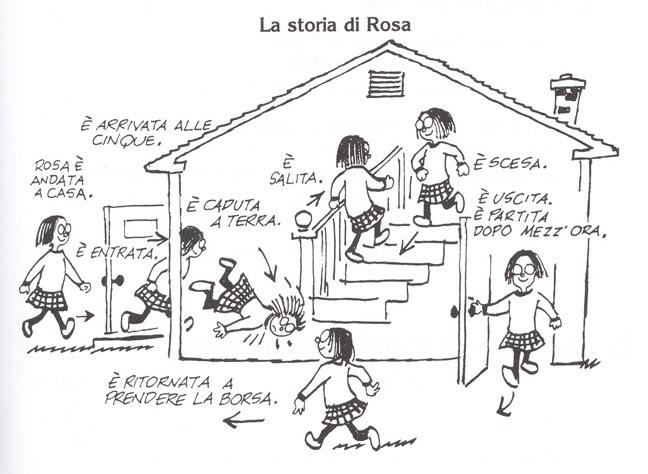4.6: Il passato prossimo
- Page ID
- 147712
The present perfect and simple past
The passato prossimo is the tense Italians use to talk about anything that happened in the past, whether yesterday (ieri) or two years ago (due anni fa). Ho ordinatoun caffè means both I have ordered a coffee and I ordered a coffee.
There is another simple past in Italian, passato remoto, which is a historical past (mostly used in literature and for historical events, not much in everyday Italian, with a few exceptions). You will study this tense at the intermediate level.
The passato prossimo is made up of two words – (1) the present tense of avere or essere and (2) the past participle of the verb, as in the examples:
Ho comprato una casa
Sono andato a casa
How do you form the past participles of verbs?
- For verbs in –are: –are turns into –ato, as in comprare > comprato.
- For verbs in –ere: –ere turns into –uto, as in ricevere > ricevuto.
- For verbs in –ire: –ire turns into –ito, as in preferire > preferito.
Guardiamo!
Dai un commento a questo video.
Il film è Michelangelo l'Infinito. https://youtu.be/RQaY375AZfs
Leggi cosa scrive di Michelangelo:
Michelangelo raccontato da Vasari.
Mentre molti artisti continuano a seguire la via indicata da Giotto, nasce un uomo che riceve da Dio grandissimi doni. In aggiunta al dono dell’arte, Michelangelo ha ricevuto il dono della filosofia morale, della poesia e di una buonissimo comportamento. Michelangelo è stato un uomo di grande virtù e Firenze è onorata per essere stata la sua patria.
Michelangelo è nato nel Casentino nel 1474 il 6 marzo da una nobildonna e da Ludovico Buonarroti Simoni, discendente della famiglia dei conti di Canossa. Finito il suo mandato di podestà di quel paese, Ludovico e suo figlio sono tornati a Firenze. Michelangelo è cresciuto con una balia che era moglie di un artigiano che lavorava le pietre. In seguito Michelangelo come i suoi fratelli hanno cominciato a lavorare presso l’Arte della lana e della seta. MIchelangelo amava disegnare e dopo alcune resistenze da parte padre, ha iniziato il suo apprendistato con Domenico Ghirlandaio. Il Ghirlandaio ammirava i disegni di Michelangelo e ha detto: “Lui è più dotato di me”. Un giorno Lorenzo De’ Medici ha chiesto a Domenico Ghirlandaio il nome di due scultori per il suo Giardino D’Arte. Il Ghirlandaio ha dato il nome di Michelangelo e Francesco Granaccio. A Lorenzo il Magnifico è cominciato subito a piacere Michelangelo, non solo per le sue doti, ma anche per il suo carattere.
Qui puoi leggere l'originale:
Leggi il testo, e trova i verbi al passato prossimo.
LEGGIAMO!
|
Il signor Mattarella arriva al suo albergo e trova sua figlia Laura. Mattarella: “Ciao Laura, come stai? Che cosa hai fatto oggi? Hai fatto spese?” Laura Mattarella: “Sto bene. No, non ho fatto spese. Sono andata al museo della scienza. Ho ricevuto un invito da un caro amico e ho fatto una visita guidata.” Mattarella: “Molto bene. Dov’è questo museo e che cosa hai visto di bello?” Laura Mattarella: “Il museo della scienza è molto vicino alla Galleria degli Uffizi. Si chiama Museo Galilei. Galileo Galilei è stato un importante scienziato. Sono andata a vedere una mostra intitolata: Leonardo arte e scienza. Ho imparato molte cose sui progetti di Leonardo Da Vinci. E tu cosa hai fatto?” Mattarella: “Oggi ho incontrato la signora Oprah Winfrey. Lei è una signora americana in vacanza. Abbiamo parlato un po’ e poi siamo andati a vedere le Cappelle Medicee. Poi abbiamo camminato per il centro di Firenze. Ho invitato la signora a venire al concerto di stasera. Abbiamo un appuntamento con lei alle 20:30 in piazza Duomo, va bene?” Laura Mattarella: “Certo, sono contenta di conoscere una signora americana.” |
Per sapere di più: L'Italia e le scienze
The present perfect AVERE o ESSERE?
How do you know whether to use avere or essere?
- Avere is basically always used when a direct object follows an action, as in Ho ordinatoun caffè [I ordereda coffee]. In this case, caffè is the direct object. A direct object can also be a person, as in Ho conosciuto Federico [I met Federico]. The direct object may not be explicit, as in Ho ordinato or abbiamo mangiato.
- Essere is basically used with verbs that express moving from a place to another (i.e. andare), when there is no direct object, but rather the action of moving to or from a place, as you can see in La storia di Rosa:

Picture taken from pinterest.com
Verbs expressing states of being like nascere [to be born], crescere [to grow], diventare [to become], morire [to die], rimanere/restare/stare [to stay] and essere also take essere. Stare and essere share the same past participle: sono stato/a means I have been, I was and I stayed.
Reflexive verbs (which you will learn in elementary II) also take essere.
Study the following conjugations:
| comprare | |
| (io) ho comprato | I bought |
| (tu) hai comprato | you bought |
| (lui) ha comprato | he bought |
| (lei, Lei) ha comprato | she, You bought |
| (noi) abbiamo comprato | we bought |
| (voi) avete comprato | you guys bought |
| (loro) hanno comprato | they bought |
As you notice, comprato never changes.
| partire | |
| (io) sono partito/a | I left |
| (tu) sei partito/a | you left |
| (lui) è partito | he left |
| (lei) è partita | she left |
| (Lei) è partito/a | You (formal) left |
| (noi) siamo partiti/e | we left |
| (voi) siete partiti/e | you guys left |
| (loro) sono partiti/e | they left |
As you notice, partito takes the same form of an adjective: partito, partita, partiti, partite. It depends on who the subject is: a woman will say sono partita alle nove, but two men will say siamo partiti alle nove.
Many verbs, especially in –ere and –ire, have irregular past participles, which you need to memorize:
| infinitive | irregular past participles |
|
accendere [to switch on, to turn on] aprire [to open] bere [to drink] chiedere [to ask] chiudere [to close] condividere [to share] correre [to run] decidere [to decide] dire [to say / to tell] fare [to do / to make] leggere [to read] mettere [to put] morire [to die] nascere [to be born] offrire [to offer] piangere [to cry] prendere [to take] perdere [to lose] ridere [to laugh] rompere [to break] scegliere [to choose] scrivere [to write] spegnere [to switch off / to turn off] vedere [to see] venire [to come] vincere [to win] vivere [to live] |
acceso (ho acceso) aperto (ho aperto) bevuto (ho bevuto) chiesto (ho chiesto) chiuso (ho chiuso) condiviso (ho condiviso) corso (ho corso; sono corso/a) deciso (ho deciso) detto (ho detto) fatto (ho fatto) letto (ho letto) messo (ho messo) morto (sono morto/a) nato (sono nato/a) offerto (ho offerto) pianto (ho pianto) preso (ho preso) perso (ho perso) riso (ho riso) rotto (ho rotto) scelto (ho scelto) scritto (ho scritto) spento (ho spento) visto (ho visto) venuto (sono venuto/a) vinto (ho vinto) vissuto (ho vissuto; sono vissuto/a) |
* A very few verbs can take either avere or essere, depending on the nuance of the situation. Don’t worry about it now.


